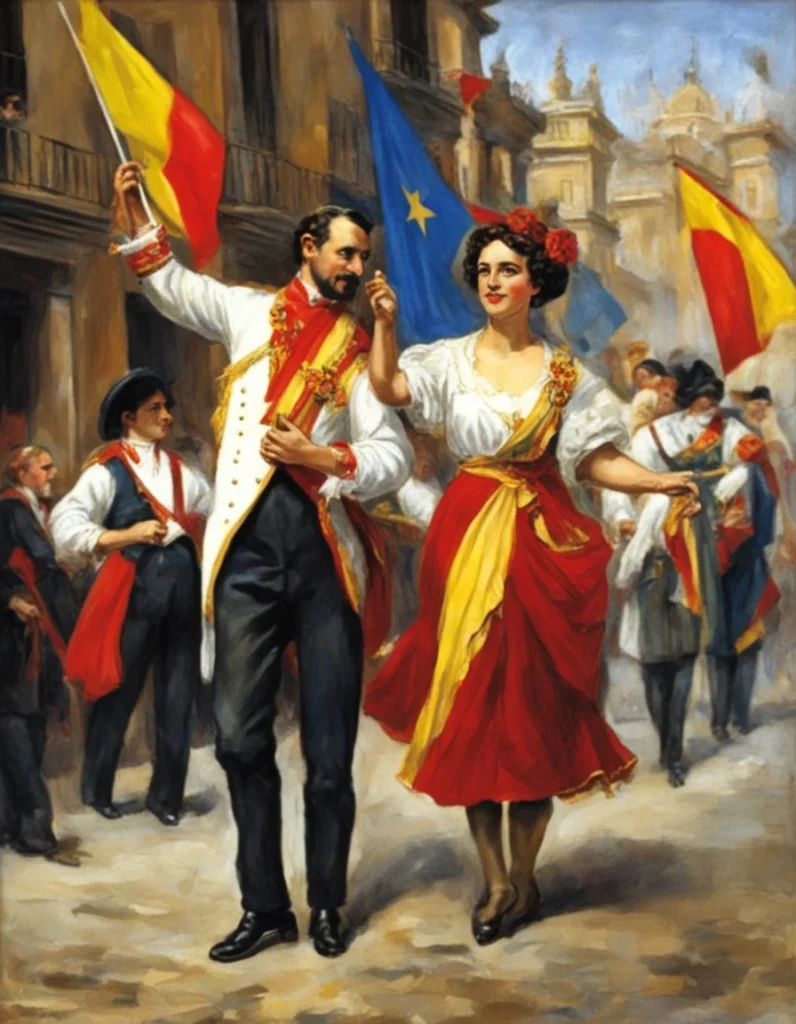Fiesta Nacional de España – A festival of colors and traditions
Fiesta Nacional de España – A festival of colors and traditions
Fiesta Nacional de España – A festival of colors and traditions
Fiesta Nacional de España – A festival of colors and traditions
11. Oktober 2024
Feedback: 0
The Fiesta Nacional de España, also known as Spain’s National Day, is celebrated annually on October 12th. This day holds a deep historical and cultural significance, marking the discovery of America by Christopher Columbus in 1492. It’s a celebration not just of Spain’s rich culture and diverse history, but also of the unity among its various regions. On this day, Spaniards proudly celebrate their heritage and take the opportunity to enjoy the day with family and friends.
Historical Background of Spain’s National Day
October 12th is a pivotal date in Spanish history. It was the day in 1492 when Christopher Columbus first landed in the Americas, an event that transformed Spain and the world. The discovery initiated a new era of colonization and intercontinental exchange, but it also led to the devastating displacement of many indigenous cultures. As awareness of this darker history has grown, there have been discussions about how modern society should approach the celebration of this day.
Celebrations Across Spain
The celebrations for the Fiesta Nacional de España are vibrant and varied, showcasing the rich diversity of Spanish culture. In many cities, large parades take place, featuring traditional music, dance, and colorful costumes. Madrid hosts a particularly notable parade in front of the Spanish Parliament, where thousands of spectators gather to witness the spectacle.
Madrid’s parade is a highlight of the day, with military displays, marching bands, and participants dressed in traditional attire. The event is further elevated by the presence of King Felipe VI and other members of the royal family, adding a touch of national pride to the occasion.
Spanish Cuisine During the Fiesta Nacional
Traditional Spanish food plays a crucial role in the Fiesta Nacional de España. On this day, Spaniards across the country indulge in regional specialties. In Andalusia, tapas made with olive oil and fresh ingredients are popular, while in Catalonia, locals might enjoy Pa amb tomàquet (bread with tomato). Additionally, the famous paella from Valencia often graces the dining tables during the celebrations.
A beloved treat during the festivities is churros paired with hot chocolate. These sweet dough sticks are a favorite among both children and adults, adding to the festive atmosphere and making the day a sensory delight.
Regional Variations in Celebrations
While October 12th is a national holiday, celebrations vary significantly across Spain’s different regions. In Catalonia, the day is often called Dia de la Hispanidad, emphasizing the region’s unique cultural identity. Meanwhile, traditional Basque music and dances take center stage in the Basque Country, celebrating its distinct heritage.
In Galicia, the day is marked by folkloric performances and deeply rooted traditions. Locals dress in traditional costumes and perform ancient dances that reflect the region’s history and cultural customs.
Music and Dance During the Fiesta Nacional
Music is an integral part of the Fiesta Nacional de España. Across the country, concerts and live performances by local bands entertain crowds. From the soulful rhythms of flamenco—which originated in Andalusia—to folk music and modern pop songs, the celebrations offer something for everyone.
Flamenco captivates audiences with its intense passion, blending dance and music to create a unifying, unforgettable experience. Dancing is a central feature of the festivities, with spontaneous dancing in the streets, bars, and public squares. The festive atmosphere reflects the joy and pride that Spaniards feel for their culture.
Significance of the National Holiday
The Fiesta Nacional de España is more than a day of celebration. It serves as a reminder of Spain’s rich cultural tapestry, where various cultures and traditions coexist harmoniously. The holiday encourages reflection on the shared identity that unites all Spaniards, despite regional differences.
In recent years, national identity and cultural diversity have been subjects of increasing discussion. Many reflect on Spain’s challenges multicultural challenges and opportunities, considering how regions can collaborate for a brighter future.
Political and Social Aspects of the Fiesta Nacional
Spain’s National Day is not without its political implications. While many enjoy the day’s festivities, others criticize the holiday due to its colonial undertones. In recent years, some groups have advocated for reforming or even abolishing the holiday in favor of a more inclusive and sensitive approach to Spain’s history.
The topic of identity is also central. At a time when Spain grapples with questions of regional autonomy and independence—particularly in Catalonia—the National Day often becomes a forum for debate. It provides an opportunity for the country to come together and discuss its future and the values it wishes to uphold.
Conclusion
The Fiesta Nacional de España is much more than a simple holiday. It’s a vibrant celebration of Spain’s diversity, rich traditions, and deep cultural heritage. Whether in the bustling streets of Madrid or the quieter corners of rural Spain, people come together to honor their love for their country.
The day is filled with joy, music, and delicious food, and it’s a moment for Spaniards to express their pride in their culture and history. At the same time, it’s a day of reflection on Spain’s future and how its diverse regions can continue to coexist peacefully.
Whether you experience the Fiesta in Madrid, Barcelona, or a small village, the Fiesta Nacional de España is an unforgettable event that celebrates the heart and soul of Spanish identity.
We hope these tips help you master your expat life even better! Do you have your own experiences or further& recommendations on the topic of moving abroad? Feel free to leave us a comment! Share this post with others who could benefit from these tips, and stay tuned for more inspiration from life as an expat.
Your Steffi & Marius

Wir sind zwei deutsche Auswanderer und auf emigres-life nehmen wir Dich mit auf unsere Reise in ein neues Leben.
In unserem Projekt schwingt das Pendel meist in Richtung stressig oder chaotisch und weniger in Richtung tiefenentspannt.
Wenn du also wissen willst, in welches Fettnäpfchen wir als nächstes treten oder welche Hürden vor uns liegen und wie wir sie überwinden, dann bleib dran.
Nächster Blogpost
Warum Oktober in Valencia der perfekte Monat zum Säen ist
Vorhergehender Blogpost
5 Gründe, warum die Fiesta Nacional de España so bunt und traditionsreich ist



 Pin it!
Pin it!

